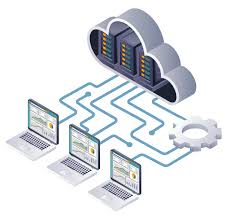
The Evolution of Computer Computing
Computer computing has come a long way since the early days of room-sized machines with limited processing power. The evolution of computer technology has revolutionized the way we work, communicate, and live our daily lives.
From the invention of the first mechanical computers in the 19th century to the development of modern supercomputers capable of performing complex calculations at incredible speeds, the history of computer computing is a testament to human ingenuity and innovation.
Advancements in hardware and software have led to significant improvements in computing capabilities over the years. The introduction of transistors, integrated circuits, and microprocessors paved the way for smaller, faster, and more powerful computers that could perform a wide range of tasks with greater efficiency.
With the rise of personal computers in the 1970s and 1980s, computing became more accessible to individuals and businesses alike. The development of graphical user interfaces, operating systems, and networking technologies further expanded the possibilities of computer computing.
Today, we live in a world where computers are ubiquitous – from smartphones and tablets to laptops and servers. Cloud computing has enabled us to store and access vast amounts of data remotely, while artificial intelligence and machine learning are pushing the boundaries of what computers can achieve.
As we look to the future, quantum computing promises to revolutionize computer technology once again by harnessing the principles of quantum mechanics to perform calculations at speeds that would be impossible with classical computers.
The evolution of computer computing is a story of constant innovation and progress. As technology continues to advance, we can only imagine what incredible feats computers will be capable of in the years to come.
5 Essential Tips for Keeping Your Computer Secure and Running Smoothly
- Regularly update your operating system and software to ensure security and performance improvements.
- Back up your important files and data regularly to prevent loss in case of hardware failure or malware attacks.
- Use strong, unique passwords for all your accounts and consider using a password manager to keep track of them.
- Be cautious when clicking on links or downloading attachments from unknown sources to avoid malware infections.
- Keep your computer physically clean by dusting it regularly and ensuring proper ventilation for optimal performance.
Regularly update your operating system and software to ensure security and performance improvements.
Regularly updating your operating system and software is crucial to maintaining the security and performance of your computer. Software updates often include patches for known vulnerabilities, helping to protect your system from potential cyber threats. Additionally, updates can bring performance improvements, bug fixes, and new features that enhance the overall user experience. By staying up to date with the latest updates, you can ensure that your computer remains secure, stable, and optimized for optimal performance.
Back up your important files and data regularly to prevent loss in case of hardware failure or malware attacks.
It is crucial to back up your important files and data regularly to safeguard against potential loss due to hardware failure or malware attacks. By creating backups of your valuable information on external drives, cloud storage, or other secure platforms, you can ensure that even if your computer experiences a malfunction or is targeted by malicious software, your data remains safe and accessible. Taking proactive measures to back up your files is a simple yet effective way to protect your digital assets and minimize the impact of unforeseen events on your computing experience.
Use strong, unique passwords for all your accounts and consider using a password manager to keep track of them.
When it comes to computer computing, one essential tip is to use strong, unique passwords for all your accounts. By creating complex passwords that are different for each account, you can significantly enhance your online security and protect your personal information from unauthorized access. Consider using a password manager to securely store and manage your passwords, making it easier to keep track of them without compromising on security. Taking these measures can help safeguard your digital identity and ensure a safer computing experience in today’s interconnected world.
Be cautious when clicking on links or downloading attachments from unknown sources to avoid malware infections.
It is crucial to exercise caution when interacting with links or downloading attachments from unfamiliar sources to prevent the risk of malware infections. Malicious actors often use deceptive tactics to lure users into clicking on harmful links or downloading malicious attachments, which can compromise the security of your computer system and personal data. By staying vigilant and verifying the legitimacy of sources before clicking on links or downloading files, you can help safeguard your devices against potential cybersecurity threats.
Keep your computer physically clean by dusting it regularly and ensuring proper ventilation for optimal performance.
To maintain optimal performance of your computer, it is important to keep it physically clean by dusting it regularly and ensuring proper ventilation. Dust buildup can clog internal components and obstruct airflow, leading to overheating and decreased performance. By regularly cleaning your computer and ensuring good ventilation, you can prevent potential hardware issues and help your system run smoothly for longer periods of time.
